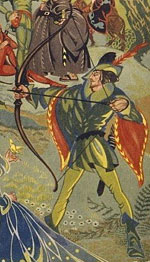










Introduction by Max Etchemendy
Magna Carta: "We have in the first place granted to God and by this our present charter have confirmed, for us and our heirs forever, that the English Church shall be free and shall have its rights entire and its liberties inviolate.
We have also granted to all freemen of our kingdom, for us and our heirs forever, all the liberties hereinunder written, to be had and held by them and their heirs of us and our heirs."
A Landmark for Legal History

Robin Hood by Joyce Merier
Robert Grosseteste and Robin Hood: A lesson on the Magna Carta's sister document, the Charter of the Forest
Magna Carta — the Great Charter — is one of the most important documents in legal history. The original version of the Charter was, in essence, forced upon the widely despised King John “Lackland” in 1215 by rebellious barons.
You may remember King John as the unimpressive younger brother of the great military hero Richard the Lionheart. He also appears as one of the villains in versions of the Robin Hood myth.
John was not the first Anglo-Norman king to face rebellious nobles, though his “reckless oppression,”1 high taxes, and unwillingness to listen to his barons’ advice2 led to especially fierce resistance.
Imposing Limits and Regulations
How did the Great Charter lessen the barons’ worries about abuses of royal power? Among other things, the Charter regularized relations between barons and tenants to avoid royal interference and abuse. It also regulated courts and put limits on the king’s ability to limit the movement of foreign merchants.3
But perhaps the most famous provisions of the Charter were those preventing a man from being convicted without due process of law (Chapter 39)*. This meant that a man could not be imprisoned, exiled, made an outlaw, or have his lands confiscated without going through proper, established legal processes (for example, a fair trial by battle or jury)†.
Rule of Law and Personal Liberty
The Charter’s immediate result was “to familiarize people with the idea that by means of a written document it was possible to make notable changes in the law.”4
But over the centuries, Magna Carta became a symbol of the rule of law. Ralph Turner explains: “[T]he Charter…established the basic principle that the rule of law ensures personal liberty. First, the executive power must proceed by recognized legal process, never unlawfully…Second, no one is above the law, however high his or her status.”5
Eight centuries later, these ideas lie at the foundation of the Anglo-American legal tradition.
Bibliography
Theodore F. T. Plucknett. A Concise History of the Common Law. 5th ed. Union, NJ: The Lawbook Exchange, 2001.
Ralph V. Turner. Magna Carta. Harlow: Pearson, 2003.
1. Plunknett pp. 22.
2. Turner pp. 22.
3. Plunknett pp. 24-25.
4. Plunknett pp. 25-26.
5. Turner pp. 1-2.
*: Magna Carta defines these procedures as "the lawful judgment of [a defendant's] peers or by the law of the land" (MC 39). Of course, that's not very specific...it doesn't tell us what the law of the land is! A person would have to turn to other sources to answer that question. But this provision makes it clear that the King can't just do whatever he wants whenever he wants. Even his courts, his sheriffs, and his foresters would have to obey the law.
†: This practice was introduced to England by the Normans, and by the time of Magna Carta it was already something of a relic of an older, more savage time: it wasn't available in all legal actions, and litigants increasingly found ways to avoid it. (Even though God was supposed to favor the rightful party, everybody knew it was still a gamble, not to mention dangerous and painful for whoever had to do the actual fighting.) Still, trial by battle wasn't formally abolished in England until 1819.